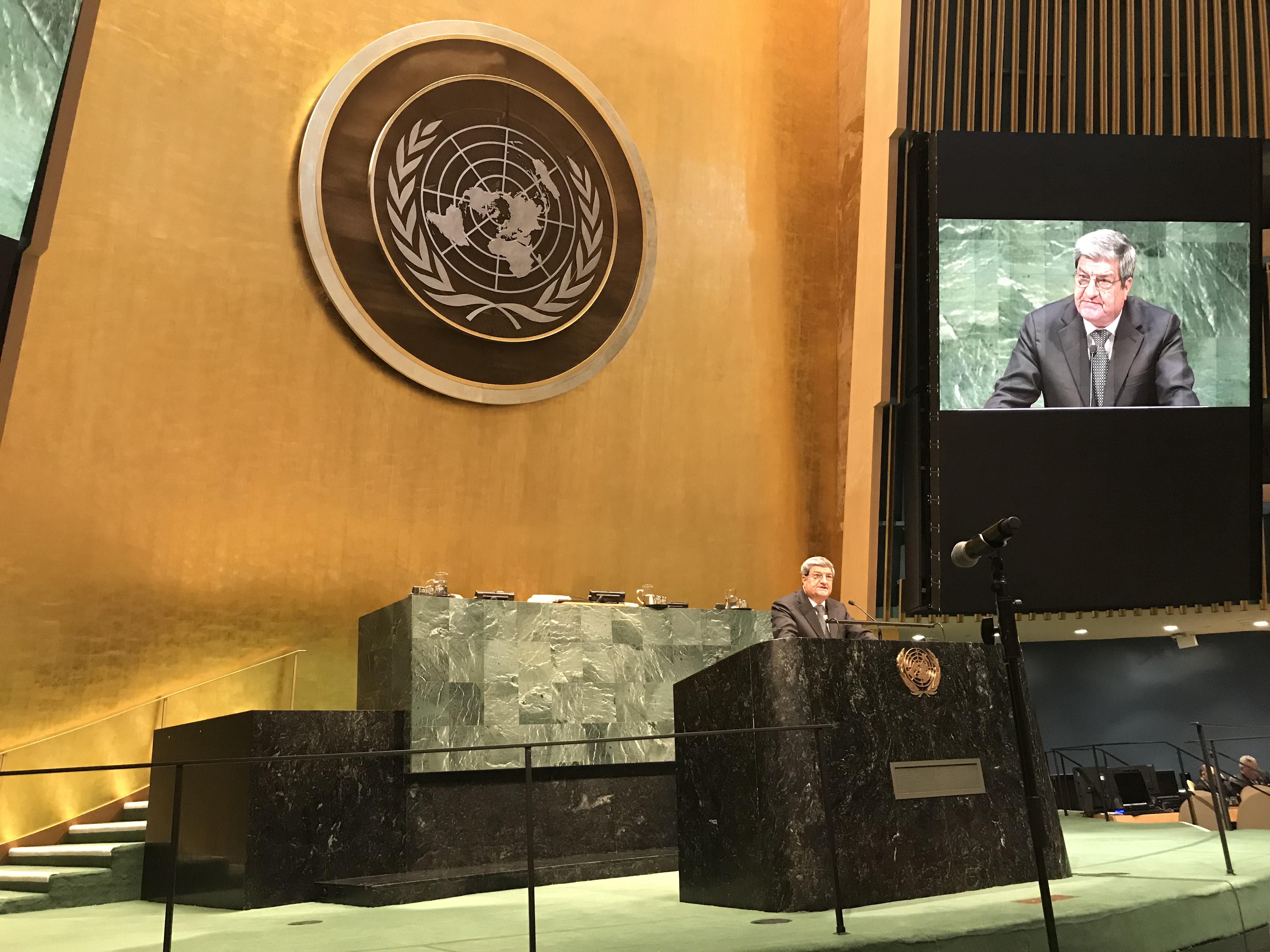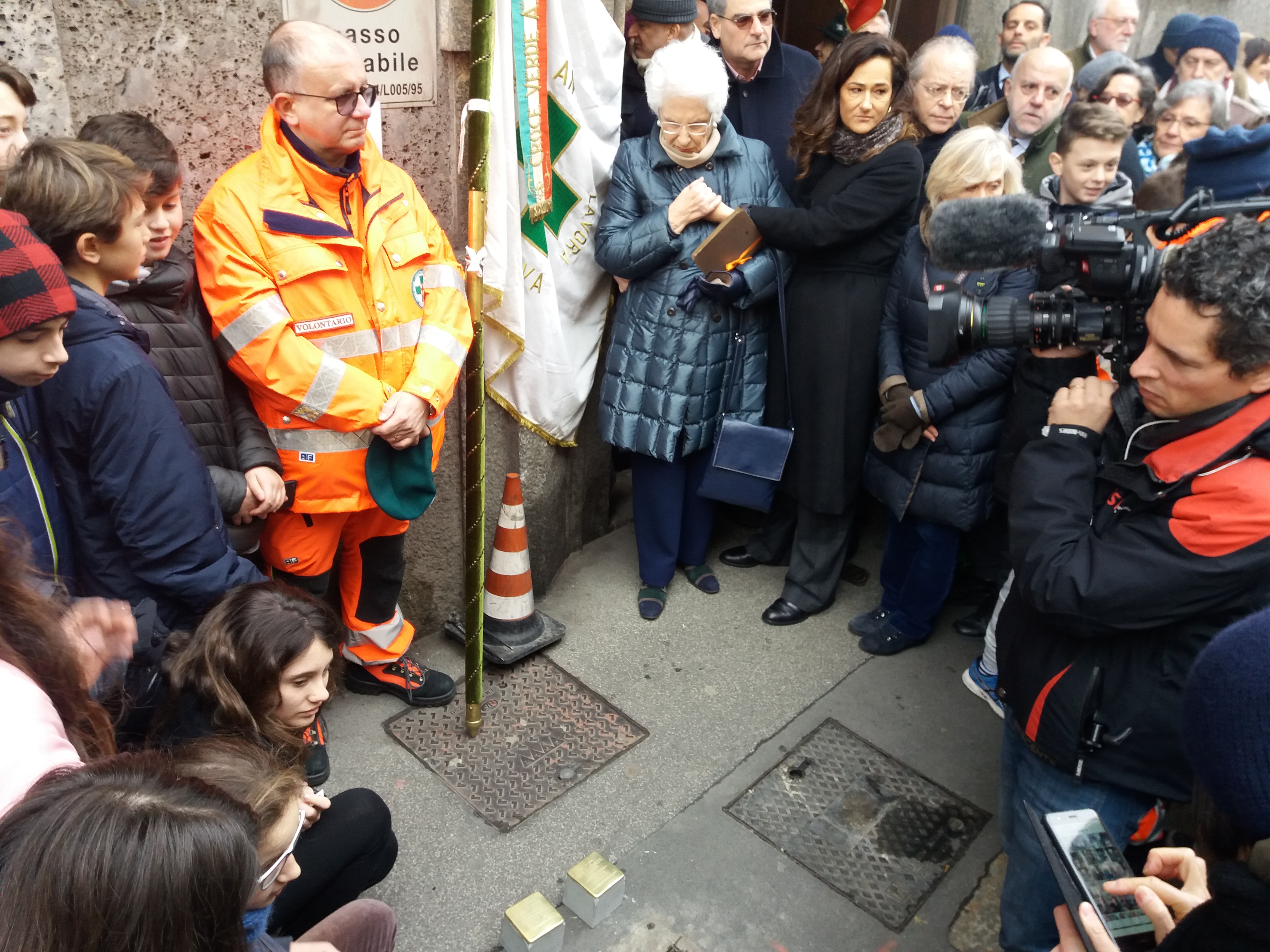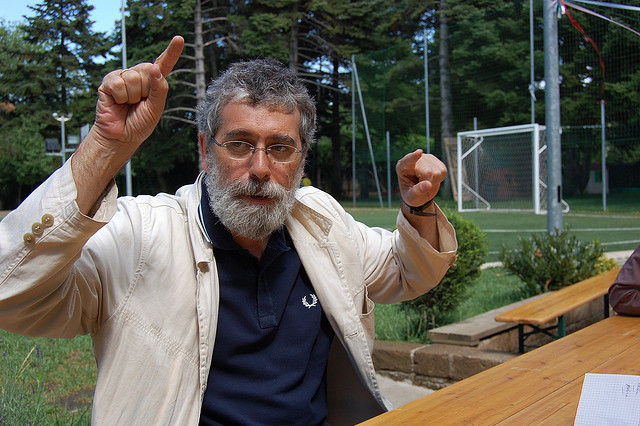Having trouble viewing this email? Click here


|
news IHRA Chair De Bernardin: "Remembrance:  Ambassador Sandro De Bernardin, chair of the International Holocaust Remembrance Alliance, delivered the following speech before the United Nations General Assembly and the Secretary General Antonio Guterres on January 27, 2019, marking the International Holocaust Remembrance Day: Secretary-General Guterres, Under-Secretary General Smale, President Espinosa, Excellencies, It is a great honor to address you in my capacity as the Chair of the International Holocaust Remembrance Alliance: an intergovernmental body of 32 member countries that are formally committed to strengthening, advancing and promoting Holocaust education, remembrance and research. This morning we heard expressions of concern and appeals to act, in order to keep the memory alive and stand against the return of such dark times. The IHRA is the most structured response provided by the International community to these concerns. Its creation was prompted, some twenty years ago, by the findings of a poll, showing that the horror of Auschwitz, Treblinka, Sobibor were at risk of disappearing from the collective memory of new generations. Since then, the members of the IHRA have worked to reverse this trend. But is collective memory in better shape today? In particular, are people aware enough that the Holocaust was not an incident of History that came out of the blue, but was the outcome of a process marked by very specific milestones? And that prominent among these milestones was the legal discrimination of sectors of the social body? That the Holocaust was announced by the progressive denial of human rights of individuals and groups? |
|
Nachrichten Korso Magenta 55, Segre Haus 
Pagine Ebraiche staff |
|
events Limmud Italia To Take Place in Parma  Pagine Ebraiche Staff Pagine Ebraiche StaffLimmud Italia, the Italian branch of the international Jewish organization started in the UK, will hold its next event in Parma. After Florence and Venice, the seventh edition of Limmud Italia Days will take place in the Emilia province city of Parma on June 2 and 3, 2019; pursuing the motto “Wherever you find yourself, Limmud will take you one step further on your Jewish journey”. The first night will include a dinner and a concert, while on the second day the participants will enjoy a visit to the historic synagogue of Soragna and the museum with exhibits telling the history of the local Jewish community. The event will also feature a special program for children (Young Limmud). |
|
bechol
lashon - Français Identité 
David Bidussa* |
pilpul “Caught in the thicket”: the Complexity of Faith 
By Yaakov Mascetti* |
|
ITALICS Polish Synagogues and the Italian Architects Who Designed Them  By Joel S. Davidi Weisberger* By Joel S. Davidi Weisberger*Poland, the place where the majority of the world’s Jewish population could be found by the eve of the First World War, was, of course, a land once dotted with thousands of Jewish houses of worship. Many of the original synagogues were constructed out of wood, others out of stone. No wooden synagogues survive from that period. Before we get to the Jews and their synagogues, we must place some things in context. The year is 1537 and a murder has taken place in Krakow. The unfortunate victim is an Italian architect by the name of Bartolommeo Berrecci; his alleged killer is another Italian architect. The motive: plain old jealousy. Berrecci had become wildly popular and quite wealthy, as many upper-class Poles commissioned his services. How did Poland, so far from home, become a dueling ground for ambitious Italians? To understand this, one must understand that Poland of that period was a booming center of trade, culture and architecture. It was the ideal place for architects and purveyors of culture to ply their trade and become wildly successful. It was particularly attractive to Catholics who would feel somewhat at home there—and some of whom would even go on to marry locals and settle there permanently. Bernardo Morando, also known as Bernardino or Morandi (1540-1600), was just such a man. A native of Venice, he moved to Poland in 1569. *The article was published in The Jewish Link of New Jersey on January 31, 2019. |
 |


This
newsletter is published under difficult conditions. The editors of this
newsletter are Italian journalists whose native language is Italian.
They are willing to offer their energy and their skills to give
international readers the opportunity of learning more about the
Italian Jewish world, its values, its culture and its traditions.
In spite of all our efforts to avoid this, readers may find an
occasional language mistake. We count on your understanding and on your
help and advice to correct these mistakes and improve our publication.
Pagine Ebraiche International Edition is published by the Union of
Italian Jewish Communities (UCEI). UCEI publications encourage an
understanding of the Jewish world and the debate within it. The
articles and opinions published by Pagine Ebraiche International
Edition, unless expressly stated otherwise, cannot be interpreted as
the official position of UCEI, but only as the self-expression of the
people who sign them, offering their comments to UCEI publications.
Readers who are interested in making their own contribution should
email us at desk@ucei.it
You received this newsletter because you authorized UCEI to contact
you. If you would like to remove your email address from our list, or
if you would like to subscribe using a new email address, please send a
blank email to desk@ucei.it
stating "unsubscribe" or "subscribe" in the subject field.
© UCEI - All rights reserved - The articles may only be reproduced
after obtaining the written permission of the editor-in-chief. Pagine
Ebraiche - Reg Rome Court 199/2009 – Editor in Chief: Guido Vitale.
Special thanks to: Francesco Moises Bassano, Susanna Barki, Amanda
Benjamin, Monica Bizzio, Angelica Edna Calò Livne, Eliezer Di Martino,
Alain Elkann, Dori Fleekop, Daniela Fubini, Benedetta Guetta, Sarah
Kaminski, Daniel Leisawitz, Annette Leckart, Gadi Luzzatto Voghera,
Yaakov Mascetti, Francesca Matalon, Jonathan Misrachi, Anna Momigliano,
Giovanni Montenero, Elèna Mortara, Sabina Muccigrosso, Lisa Palmieri
Billig, Jazmine Pignatello, Shirley Piperno, Giandomenico Pozzi, Daniel
Reichel, Colby Robbins, Danielle Rockman, Lindsay Shedlin,
Michael Sierra, Rachel Silvera, Adam Smulevich, Simone Somekh, Rossella
Tercatin, Ada Treves, Lauren Waldman, Sahar Zivan.
Questo notiziario è realizzato in condizioni di particolare difficoltà.
I redattori di questo notiziario sono giornalisti italiani di
madrelingua italiana. Mettono a disposizione le loro energie e le loro
competenze per raccontare in lingua inglese l'ebraismo italiano, i suoi
valori, la sua cultura e i suoi valori. Nonostante il nostro impegno il
lettore potrebbe trovare errori e imperfezioni nell'utilizzo del
linguaggio che faremo del nostro meglio per evitare. Contiamo sulla
vostra comprensione e soprattutto sul vostro aiuto e sul vostro
consiglio per correggere gli errori e migliorare.
Pagine Ebraiche International Edition è una pubblicazione edita
dall'Unione delle Comunità Ebraiche Italiane. L'UCEI sviluppa mezzi di
comunicazione che incoraggiano la conoscenza e il confronto delle
realtà ebraiche. Gli articoli e i commenti pubblicati, a meno che non
sia espressamente indicato il contrario, non possono essere intesi come
una presa di posizione ufficiale, ma solo come la autonoma espressione
delle persone che li firmano e che si sono rese gratuitamente
disponibili. Gli utenti che fossero interessati a offrire un proprio
contributo possono rivolgersi all'indirizzo desk@ucei.it
Avete ricevuto questo messaggio perché avete trasmesso a Ucei
l'autorizzazione a comunicare con voi. Se non desiderate ricevere
ulteriori comunicazioni o se volete comunicare un nuovo indirizzo
email, scrivete a: desk@ucei.it
indicando nell'oggetto del messaggio "cancella" o "modifica".
© UCEI - Tutti i diritti riservati - I testi possono essere riprodotti
solo dopo aver ottenuto l'autorizzazione scritta della Direzione.
Pagine Ebraiche International Edition - notiziario dell'ebraismo
italiano - Reg. Tribunale di Roma 199/2009 - direttore responsabile:
Guido Vitale.
Realizzato con il contributo di: Francesco Moises Bassano, Susanna
Barki, Amanda Benjamin, Monica Bizzio, Angelica Edna Calò Livne,
Eliezer Di Martino, Alain Elkann, Dori Fleekop, Daniela Fubini,
Benedetta Guetta, Sarah Kaminski, Daniel Leisawitz, Annette Leckart,
Gadi Luzzatto Voghera, Yaakov Mascetti, Francesca Matalon, Jonathan
Misrachi, Anna Momigliano, Giovanni Montenero, Elèna Mortara, Sabina
Muccigrosso, Lisa Palmieri Billig, Jazmine Pignatello, Shirley Piperno,
Giandomenico Pozzi, Daniel Reichel, Colby Robbins, Danielle
Rockman, Lindsay Shedlin, Michael Sierra, Rachel Silvera, Adam
Smulevich, Simone Somekh, Rossella Tercatin, Ada Treves, Lauren
Waldman, Sahar Zivan.